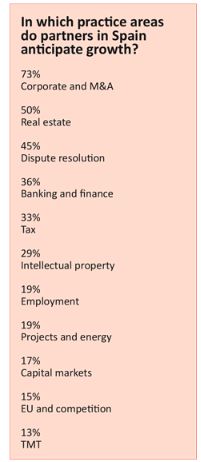New research finds that 90 per cent of partners in Spain expect their firm's revenue to grow in the coming year, with two-thirds anticipating a rise in profits

Law firm partners anticipate that an increase in corporate and M&A work, as well as a rise in real estate-related instructions, will lead to an increase in revenues and profits at law firms in Spain in 2017, according to a new survey by Iberian Lawyer.
Corporate and M&A is the practice area where most lawyers expect to see growth in the next 12 months, with 73 per cent of partners anticipating an increase in work in this area. This demonstrates growth in confidence – only 67 per cent held this view in last year´s survey. Meanwhile, real estate is seen as the second-biggest growth area, with 50 per cent of survey participants expecting more work in this field during the next 12 months.
More positive outlook

The vast majority of partners expect their firm's revenue to grow in 2017. Ninety per cent of partners said they anticipated an increase in billing, though only two-thirds of respondents (66 per cent) said they thought their profits would increase. When asked what would be the drivers of growth in the coming year, the reason most commonly cited (by 77 per cent of those surveyed) was a "greater volume of work". Two-thirds of respondents (67 per cent) said "a more positive economic outlook" would lead to growth, while 60 per cent of survey participants said "more clients" would result in increases in billing. However, only 13 per cent of partners said they thought revenues would go up because of fee increases.
While corporate/M&A and real estate are expected to be the major growth areas in the coming year, a significant proportion of partners also anticipate an increase in billing in the areas of dispute resolution (45 per cent) and banking and finance (36 per cent). Other practice areas frequently highlighted as growth areas include tax and intellectual property.
It seems doubtful that this expected growth will translate into considerably more career opportunities for aspiring lawyers. Only around one in three partners expect their firm to increase its number of lawyers in the next 12 months. A total of 37 per cent of survey respondents said they anticipated growth in headcount in 2017. Of those that did expect an increase in headcount, the majority (58 per cent) said they expected their firm to grow its number of lawyers by at least 5 per cent. Two-thirds of partners (66 per cent) expecting an increase in lawyer numbers at their firms said it would be partly achieved "through lateral hires", with the same proportion saying it would be partly attributable to increasing the trainee intake. Six per cent of respondents said their firm would increase its headcount as a result of a merger.
Four out of ten partners surveyed said work from outside Spain would contribute the most growth to their firm in 2017. However, in a sign of renewed confidence, 60 per cent of respondents said Spain-originated work would be the key driver of growth. Meanwhile, 17 per cent said the rest of Europe (excluding Spain and Portugal) would contribute the most growth. A further 13 per cent highlighted Latin America as the region that would generate the most growth at their firm.

Opening foreign offices
The approach law firms are adopting to capitalise on potential foreign growth opportunities varies. A total of 16 per cent of respondents said their firm would be "opening new foreign offices", while 14 per cent said their firm would be "joining an alliance or network". Meanwhile, 36 per cent said they would be taking steps to develop "best friends" relationships with foreign firms. However, a significant number of respondents said they would be using their existing resources to take advantage of foreign growth opportunities: 38 per cent said they would be using an existing alliance or network, 37 per cent said they would be utilising existing "best friends relationships", while 30 per cent said they would pursue foreign growth opportunities "via existing foreign offices".
A total of 91 partners in Spain participated in the research which was conducted via an online survey in November 2016.
The content of this article is intended to provide a general guide to the subject matter. Specialist advice should be sought about your specific circumstances.
